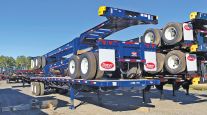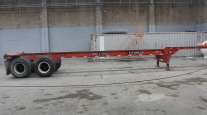Truckers Will Not Have to Submit Report Unless Chassis Is Defective, FMCSA Rules
This story appears in the Aug. 16 print edition of Transport Topics.
The Federal Motor Carrier Safety Administration said it has dropped a requirement that truckers submit a chassis condition report even if the equipment is not defective.
The decision to simplify the intermodal paperwork process could cut by 96%, or 38 million a year, the number of reports filed when truckers return chassis to ocean or rail intermodal terminals, FMCSA said Aug. 6. The documents called driver vehicle inspection reports, or DVIRs, still must be filed if drivers find defects on chassis they use.
The ruling was in response to a petition by the Ocean Carrier Equipment Management Association and the Institute of International Container Lessors, trade groups that control an estimated 85% of intermodal chassis.
In their petition filed earlier this year, OCEMA and IICL said that only about 4% of the chassis used in intermodal transport are defective. The two groups argued that the requirement to file a DVIR for a chassis without defects would waste 2 million hours a year of truckers’ time (4-26, p. 33).
“The agency agrees with the petitioners that the existing requirement for motor carriers to prepare no-defect DVIRs . . . appears likely to provide negligible safety benefits,” FMCSA said in its decision.
“This is a very positive step,” Curtis Whalen, executive director of American Trucking Associations’ Intermodal Motor Carriers Conference told Transport Topics on Aug. 11. “It will reduce the strain on the system.”
This latest ruling comes after the requirement to file DVIRs was included in the chassis safety rules that went into effect June 30. Implementation of the rules, which made chassis providers — rather than truckers — responsible for equipment maintenance, was initially delayed more than six months to give chassis providers more time to create procedures to handle the DVIR reports.
Whalen and other trucking officials have complained that the document filing process did not work properly after the chassis safety rules took effect because many ocean and rail carriers weren’t able to process the reports.
The system now has improved to the point that about two-thirds of the reports are being processed properly, he said.
However, Whalen cautioned that halting the filing of nondefective DVIRs won’t completely fix flaws in the data-filing process.
“There is still not a high degree of assurance that filed DVIRs are being correctly sent to maintenance and repair vendors who are supposed to receive the data and fix the equipment defects,” he said.
FMCSA accomplished the change by postponing the effective date for filing reports on nondefective chassis until June 30
of next year. That step allows time for the agency to start a rulemaking process and determine the best steps to smooth out the filing process, the filing said.




